Business Law: Validity of Contracts and Consumer Guarantees
VerifiedAdded on 2023/06/12
|12
|2568
|198
AI Summary
This article discusses the essential elements of a valid contract, including offer, acceptance, consideration, and intention to be legally bound. It also explores consumer guarantees under Australian Consumer Law and the consequences of breaching them. Additionally, it examines the validity of consideration in contracts and the potential consequences of invalid contracts and guarantees.
Contribute Materials
Your contribution can guide someone’s learning journey. Share your
documents today.
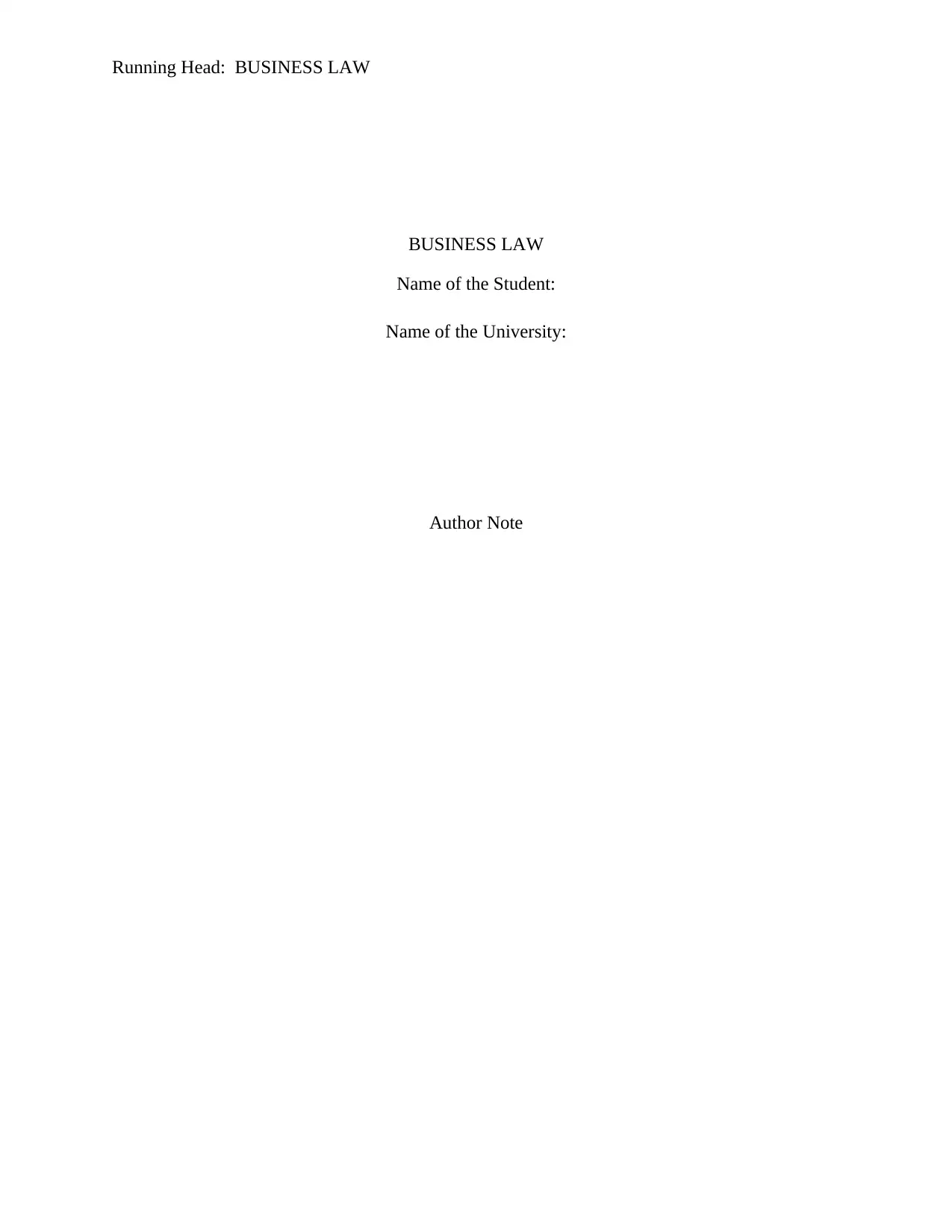
Running Head: BUSINESS LAW
BUSINESS LAW
Name of the Student:
Name of the University:
Author Note
BUSINESS LAW
Name of the Student:
Name of the University:
Author Note
Secure Best Marks with AI Grader
Need help grading? Try our AI Grader for instant feedback on your assignments.
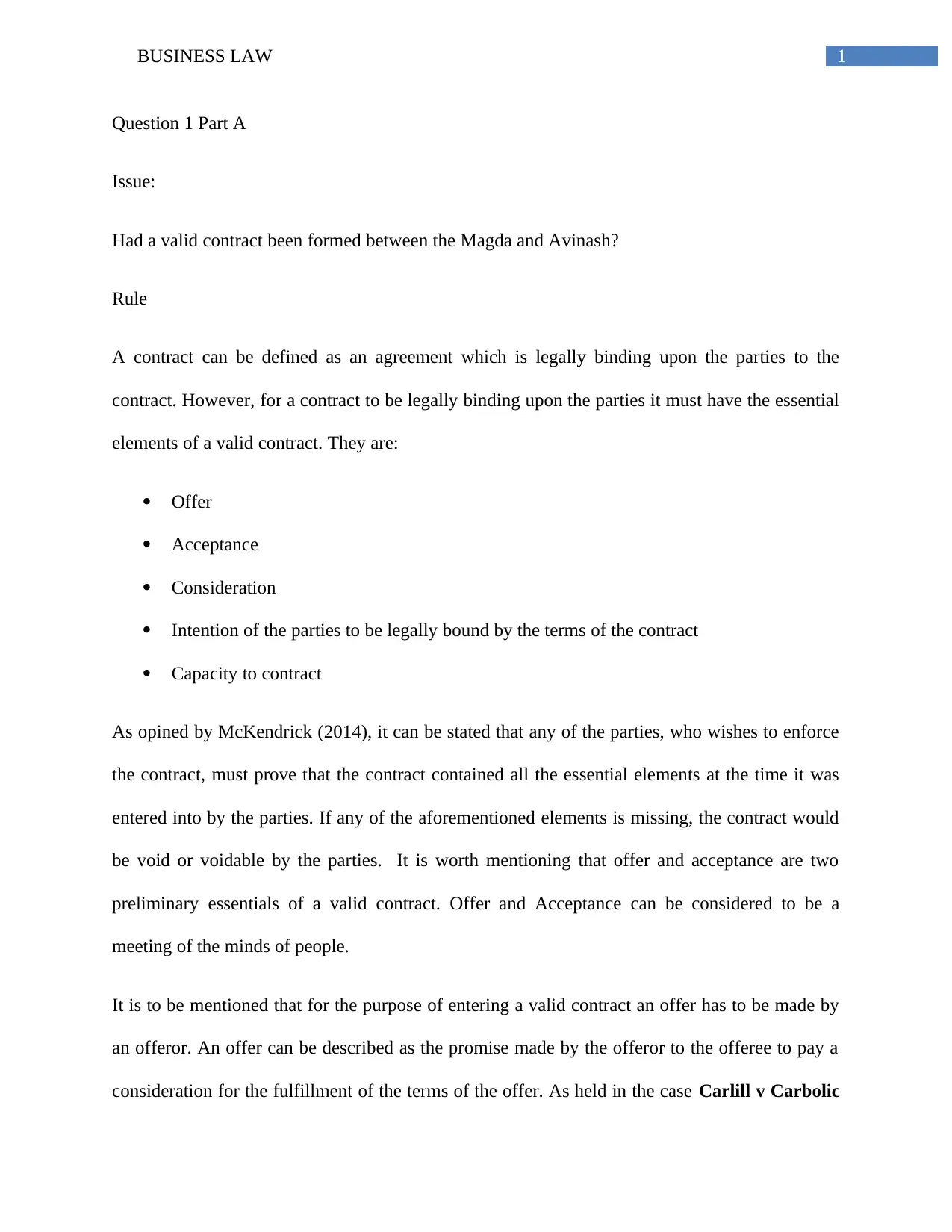
1BUSINESS LAW
Question 1 Part A
Issue:
Had a valid contract been formed between the Magda and Avinash?
Rule
A contract can be defined as an agreement which is legally binding upon the parties to the
contract. However, for a contract to be legally binding upon the parties it must have the essential
elements of a valid contract. They are:
Offer
Acceptance
Consideration
Intention of the parties to be legally bound by the terms of the contract
Capacity to contract
As opined by McKendrick (2014), it can be stated that any of the parties, who wishes to enforce
the contract, must prove that the contract contained all the essential elements at the time it was
entered into by the parties. If any of the aforementioned elements is missing, the contract would
be void or voidable by the parties. It is worth mentioning that offer and acceptance are two
preliminary essentials of a valid contract. Offer and Acceptance can be considered to be a
meeting of the minds of people.
It is to be mentioned that for the purpose of entering a valid contract an offer has to be made by
an offeror. An offer can be described as the promise made by the offeror to the offeree to pay a
consideration for the fulfillment of the terms of the offer. As held in the case Carlill v Carbolic
Question 1 Part A
Issue:
Had a valid contract been formed between the Magda and Avinash?
Rule
A contract can be defined as an agreement which is legally binding upon the parties to the
contract. However, for a contract to be legally binding upon the parties it must have the essential
elements of a valid contract. They are:
Offer
Acceptance
Consideration
Intention of the parties to be legally bound by the terms of the contract
Capacity to contract
As opined by McKendrick (2014), it can be stated that any of the parties, who wishes to enforce
the contract, must prove that the contract contained all the essential elements at the time it was
entered into by the parties. If any of the aforementioned elements is missing, the contract would
be void or voidable by the parties. It is worth mentioning that offer and acceptance are two
preliminary essentials of a valid contract. Offer and Acceptance can be considered to be a
meeting of the minds of people.
It is to be mentioned that for the purpose of entering a valid contract an offer has to be made by
an offeror. An offer can be described as the promise made by the offeror to the offeree to pay a
consideration for the fulfillment of the terms of the offer. As held in the case Carlill v Carbolic
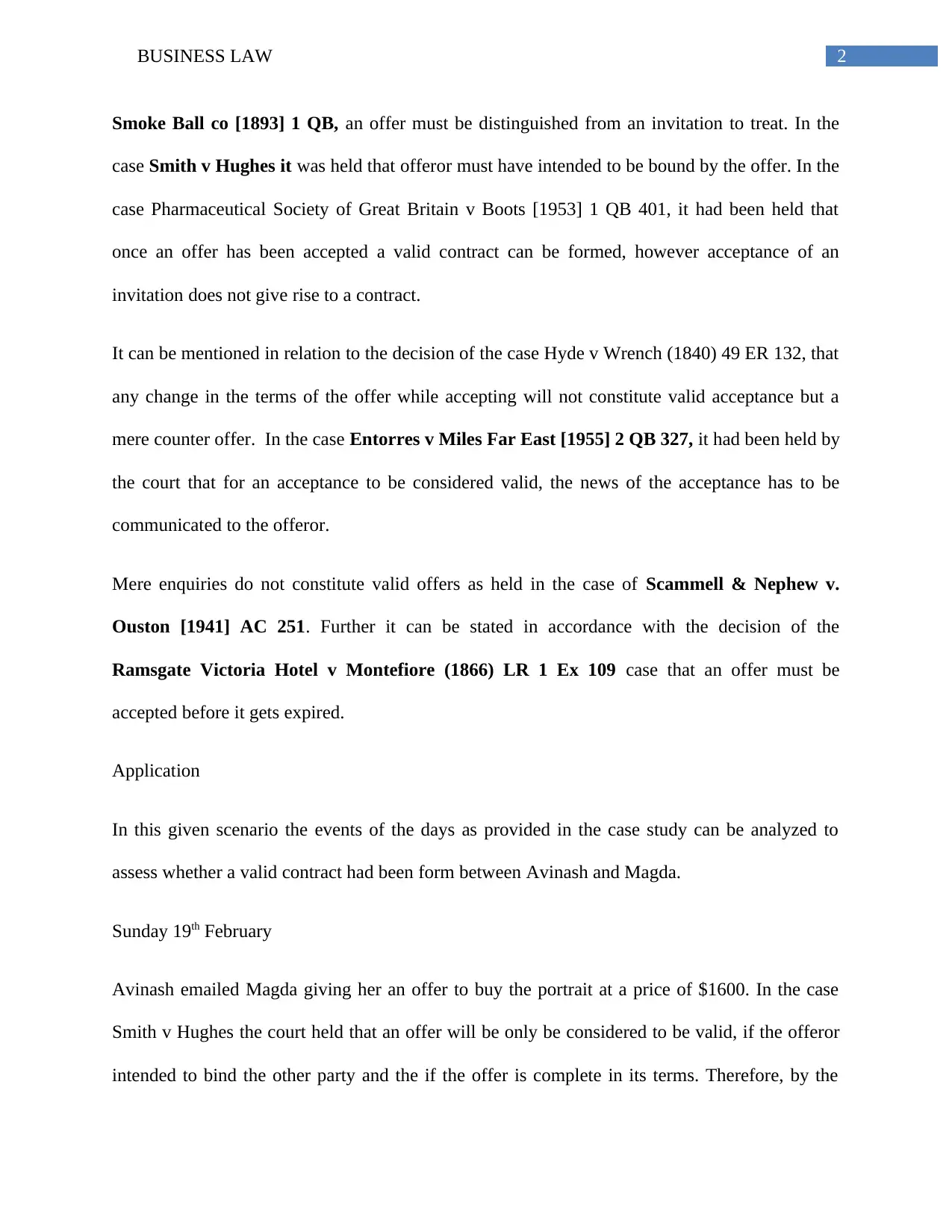
2BUSINESS LAW
Smoke Ball co [1893] 1 QB, an offer must be distinguished from an invitation to treat. In the
case Smith v Hughes it was held that offeror must have intended to be bound by the offer. In the
case Pharmaceutical Society of Great Britain v Boots [1953] 1 QB 401, it had been held that
once an offer has been accepted a valid contract can be formed, however acceptance of an
invitation does not give rise to a contract.
It can be mentioned in relation to the decision of the case Hyde v Wrench (1840) 49 ER 132, that
any change in the terms of the offer while accepting will not constitute valid acceptance but a
mere counter offer. In the case Entorres v Miles Far East [1955] 2 QB 327, it had been held by
the court that for an acceptance to be considered valid, the news of the acceptance has to be
communicated to the offeror.
Mere enquiries do not constitute valid offers as held in the case of Scammell & Nephew v.
Ouston [1941] AC 251. Further it can be stated in accordance with the decision of the
Ramsgate Victoria Hotel v Montefiore (1866) LR 1 Ex 109 case that an offer must be
accepted before it gets expired.
Application
In this given scenario the events of the days as provided in the case study can be analyzed to
assess whether a valid contract had been form between Avinash and Magda.
Sunday 19th February
Avinash emailed Magda giving her an offer to buy the portrait at a price of $1600. In the case
Smith v Hughes the court held that an offer will be only be considered to be valid, if the offeror
intended to bind the other party and the if the offer is complete in its terms. Therefore, by the
Smoke Ball co [1893] 1 QB, an offer must be distinguished from an invitation to treat. In the
case Smith v Hughes it was held that offeror must have intended to be bound by the offer. In the
case Pharmaceutical Society of Great Britain v Boots [1953] 1 QB 401, it had been held that
once an offer has been accepted a valid contract can be formed, however acceptance of an
invitation does not give rise to a contract.
It can be mentioned in relation to the decision of the case Hyde v Wrench (1840) 49 ER 132, that
any change in the terms of the offer while accepting will not constitute valid acceptance but a
mere counter offer. In the case Entorres v Miles Far East [1955] 2 QB 327, it had been held by
the court that for an acceptance to be considered valid, the news of the acceptance has to be
communicated to the offeror.
Mere enquiries do not constitute valid offers as held in the case of Scammell & Nephew v.
Ouston [1941] AC 251. Further it can be stated in accordance with the decision of the
Ramsgate Victoria Hotel v Montefiore (1866) LR 1 Ex 109 case that an offer must be
accepted before it gets expired.
Application
In this given scenario the events of the days as provided in the case study can be analyzed to
assess whether a valid contract had been form between Avinash and Magda.
Sunday 19th February
Avinash emailed Magda giving her an offer to buy the portrait at a price of $1600. In the case
Smith v Hughes the court held that an offer will be only be considered to be valid, if the offeror
intended to bind the other party and the if the offer is complete in its terms. Therefore, by the
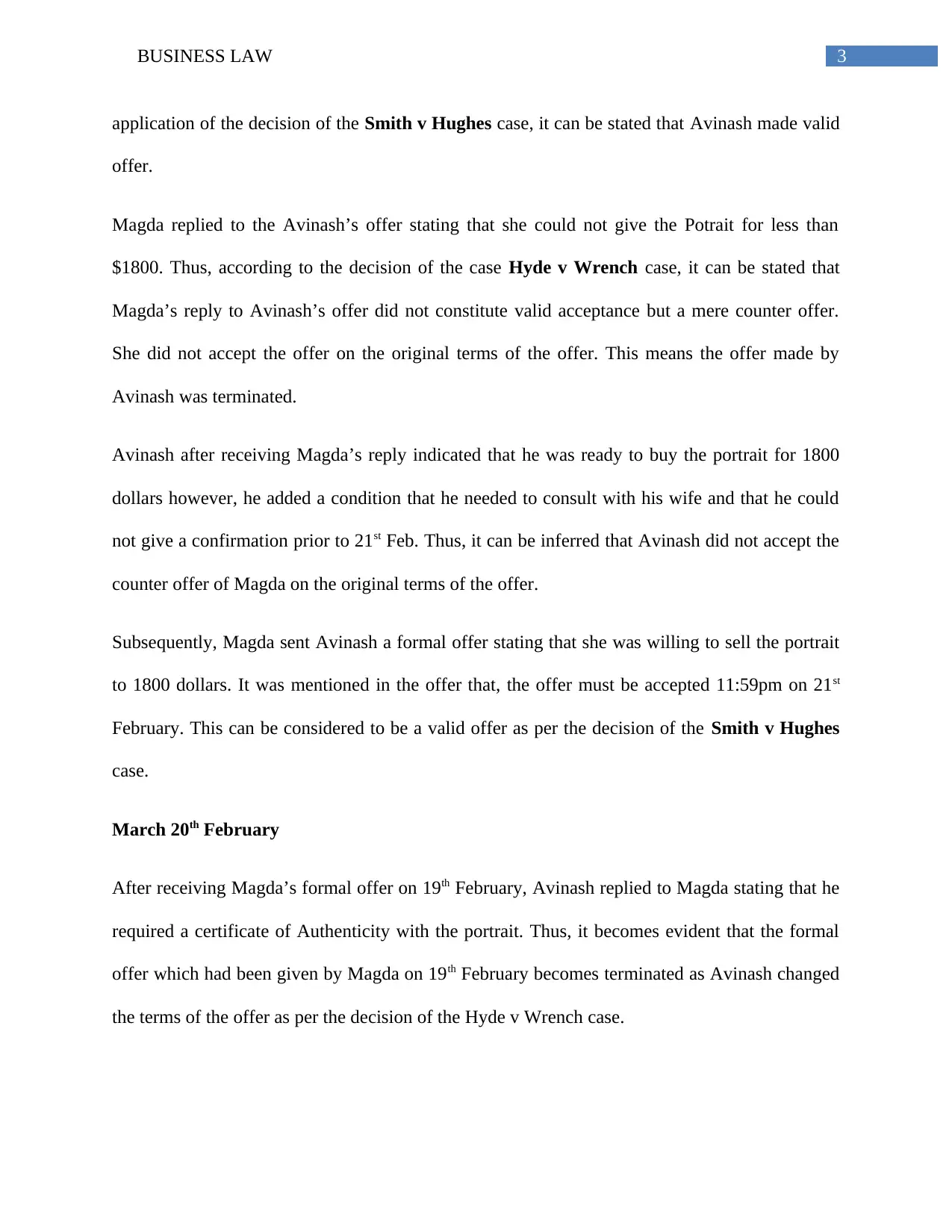
3BUSINESS LAW
application of the decision of the Smith v Hughes case, it can be stated that Avinash made valid
offer.
Magda replied to the Avinash’s offer stating that she could not give the Potrait for less than
$1800. Thus, according to the decision of the case Hyde v Wrench case, it can be stated that
Magda’s reply to Avinash’s offer did not constitute valid acceptance but a mere counter offer.
She did not accept the offer on the original terms of the offer. This means the offer made by
Avinash was terminated.
Avinash after receiving Magda’s reply indicated that he was ready to buy the portrait for 1800
dollars however, he added a condition that he needed to consult with his wife and that he could
not give a confirmation prior to 21st Feb. Thus, it can be inferred that Avinash did not accept the
counter offer of Magda on the original terms of the offer.
Subsequently, Magda sent Avinash a formal offer stating that she was willing to sell the portrait
to 1800 dollars. It was mentioned in the offer that, the offer must be accepted 11:59pm on 21st
February. This can be considered to be a valid offer as per the decision of the Smith v Hughes
case.
March 20th February
After receiving Magda’s formal offer on 19th February, Avinash replied to Magda stating that he
required a certificate of Authenticity with the portrait. Thus, it becomes evident that the formal
offer which had been given by Magda on 19th February becomes terminated as Avinash changed
the terms of the offer as per the decision of the Hyde v Wrench case.
application of the decision of the Smith v Hughes case, it can be stated that Avinash made valid
offer.
Magda replied to the Avinash’s offer stating that she could not give the Potrait for less than
$1800. Thus, according to the decision of the case Hyde v Wrench case, it can be stated that
Magda’s reply to Avinash’s offer did not constitute valid acceptance but a mere counter offer.
She did not accept the offer on the original terms of the offer. This means the offer made by
Avinash was terminated.
Avinash after receiving Magda’s reply indicated that he was ready to buy the portrait for 1800
dollars however, he added a condition that he needed to consult with his wife and that he could
not give a confirmation prior to 21st Feb. Thus, it can be inferred that Avinash did not accept the
counter offer of Magda on the original terms of the offer.
Subsequently, Magda sent Avinash a formal offer stating that she was willing to sell the portrait
to 1800 dollars. It was mentioned in the offer that, the offer must be accepted 11:59pm on 21st
February. This can be considered to be a valid offer as per the decision of the Smith v Hughes
case.
March 20th February
After receiving Magda’s formal offer on 19th February, Avinash replied to Magda stating that he
required a certificate of Authenticity with the portrait. Thus, it becomes evident that the formal
offer which had been given by Magda on 19th February becomes terminated as Avinash changed
the terms of the offer as per the decision of the Hyde v Wrench case.
Secure Best Marks with AI Grader
Need help grading? Try our AI Grader for instant feedback on your assignments.
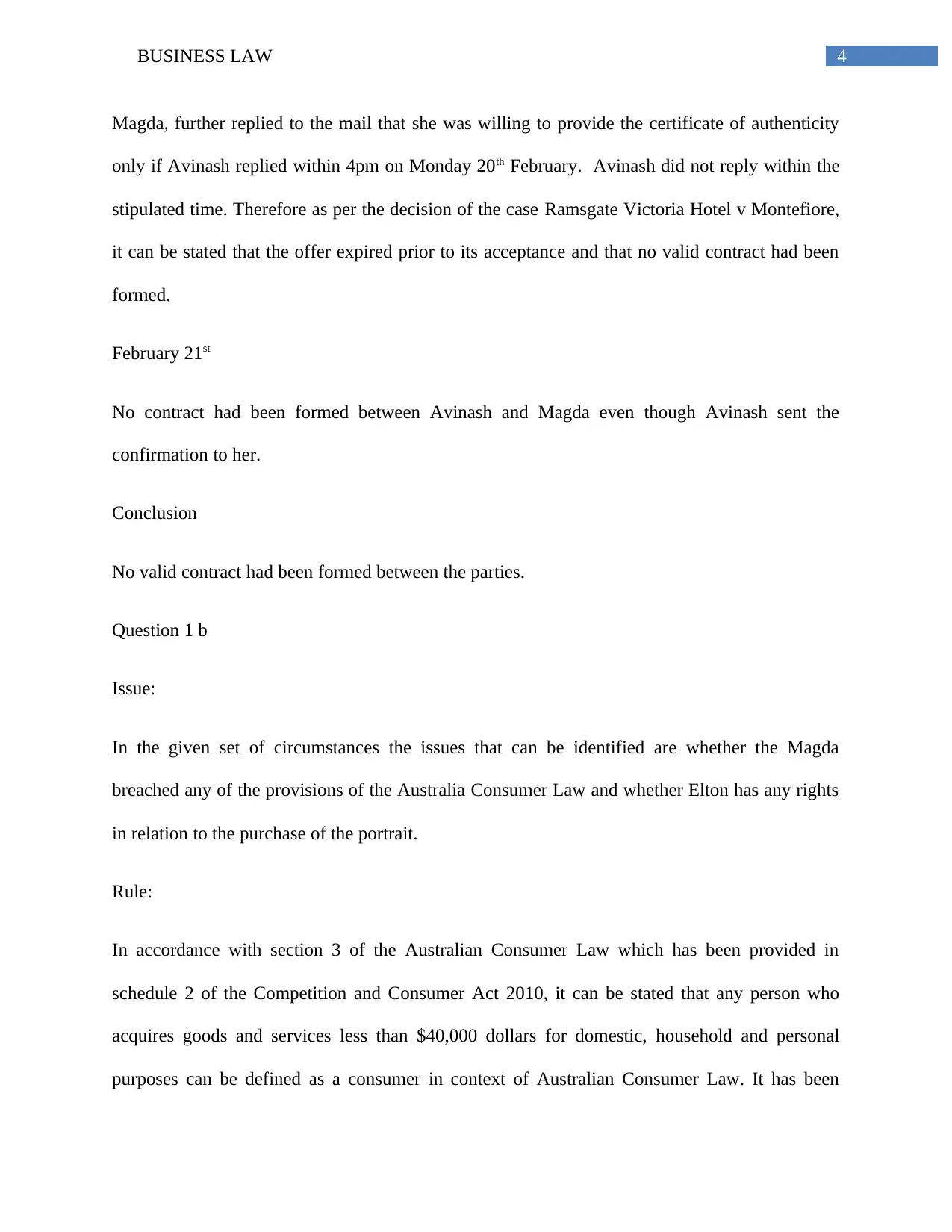
4BUSINESS LAW
Magda, further replied to the mail that she was willing to provide the certificate of authenticity
only if Avinash replied within 4pm on Monday 20th February. Avinash did not reply within the
stipulated time. Therefore as per the decision of the case Ramsgate Victoria Hotel v Montefiore,
it can be stated that the offer expired prior to its acceptance and that no valid contract had been
formed.
February 21st
No contract had been formed between Avinash and Magda even though Avinash sent the
confirmation to her.
Conclusion
No valid contract had been formed between the parties.
Question 1 b
Issue:
In the given set of circumstances the issues that can be identified are whether the Magda
breached any of the provisions of the Australia Consumer Law and whether Elton has any rights
in relation to the purchase of the portrait.
Rule:
In accordance with section 3 of the Australian Consumer Law which has been provided in
schedule 2 of the Competition and Consumer Act 2010, it can be stated that any person who
acquires goods and services less than $40,000 dollars for domestic, household and personal
purposes can be defined as a consumer in context of Australian Consumer Law. It has been
Magda, further replied to the mail that she was willing to provide the certificate of authenticity
only if Avinash replied within 4pm on Monday 20th February. Avinash did not reply within the
stipulated time. Therefore as per the decision of the case Ramsgate Victoria Hotel v Montefiore,
it can be stated that the offer expired prior to its acceptance and that no valid contract had been
formed.
February 21st
No contract had been formed between Avinash and Magda even though Avinash sent the
confirmation to her.
Conclusion
No valid contract had been formed between the parties.
Question 1 b
Issue:
In the given set of circumstances the issues that can be identified are whether the Magda
breached any of the provisions of the Australia Consumer Law and whether Elton has any rights
in relation to the purchase of the portrait.
Rule:
In accordance with section 3 of the Australian Consumer Law which has been provided in
schedule 2 of the Competition and Consumer Act 2010, it can be stated that any person who
acquires goods and services less than $40,000 dollars for domestic, household and personal
purposes can be defined as a consumer in context of Australian Consumer Law. It has been
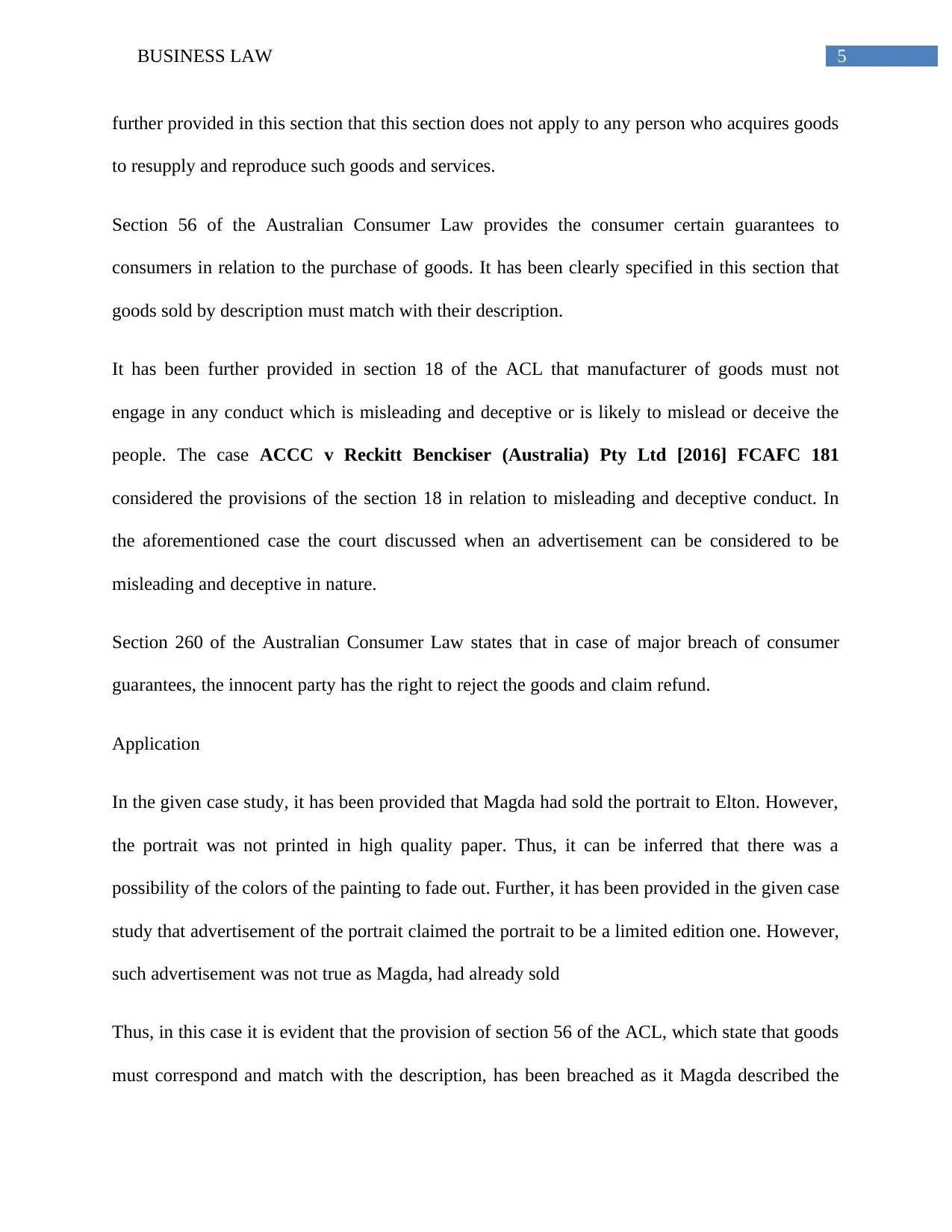
5BUSINESS LAW
further provided in this section that this section does not apply to any person who acquires goods
to resupply and reproduce such goods and services.
Section 56 of the Australian Consumer Law provides the consumer certain guarantees to
consumers in relation to the purchase of goods. It has been clearly specified in this section that
goods sold by description must match with their description.
It has been further provided in section 18 of the ACL that manufacturer of goods must not
engage in any conduct which is misleading and deceptive or is likely to mislead or deceive the
people. The case ACCC v Reckitt Benckiser (Australia) Pty Ltd [2016] FCAFC 181
considered the provisions of the section 18 in relation to misleading and deceptive conduct. In
the aforementioned case the court discussed when an advertisement can be considered to be
misleading and deceptive in nature.
Section 260 of the Australian Consumer Law states that in case of major breach of consumer
guarantees, the innocent party has the right to reject the goods and claim refund.
Application
In the given case study, it has been provided that Magda had sold the portrait to Elton. However,
the portrait was not printed in high quality paper. Thus, it can be inferred that there was a
possibility of the colors of the painting to fade out. Further, it has been provided in the given case
study that advertisement of the portrait claimed the portrait to be a limited edition one. However,
such advertisement was not true as Magda, had already sold
Thus, in this case it is evident that the provision of section 56 of the ACL, which state that goods
must correspond and match with the description, has been breached as it Magda described the
further provided in this section that this section does not apply to any person who acquires goods
to resupply and reproduce such goods and services.
Section 56 of the Australian Consumer Law provides the consumer certain guarantees to
consumers in relation to the purchase of goods. It has been clearly specified in this section that
goods sold by description must match with their description.
It has been further provided in section 18 of the ACL that manufacturer of goods must not
engage in any conduct which is misleading and deceptive or is likely to mislead or deceive the
people. The case ACCC v Reckitt Benckiser (Australia) Pty Ltd [2016] FCAFC 181
considered the provisions of the section 18 in relation to misleading and deceptive conduct. In
the aforementioned case the court discussed when an advertisement can be considered to be
misleading and deceptive in nature.
Section 260 of the Australian Consumer Law states that in case of major breach of consumer
guarantees, the innocent party has the right to reject the goods and claim refund.
Application
In the given case study, it has been provided that Magda had sold the portrait to Elton. However,
the portrait was not printed in high quality paper. Thus, it can be inferred that there was a
possibility of the colors of the painting to fade out. Further, it has been provided in the given case
study that advertisement of the portrait claimed the portrait to be a limited edition one. However,
such advertisement was not true as Magda, had already sold
Thus, in this case it is evident that the provision of section 56 of the ACL, which state that goods
must correspond and match with the description, has been breached as it Magda described the
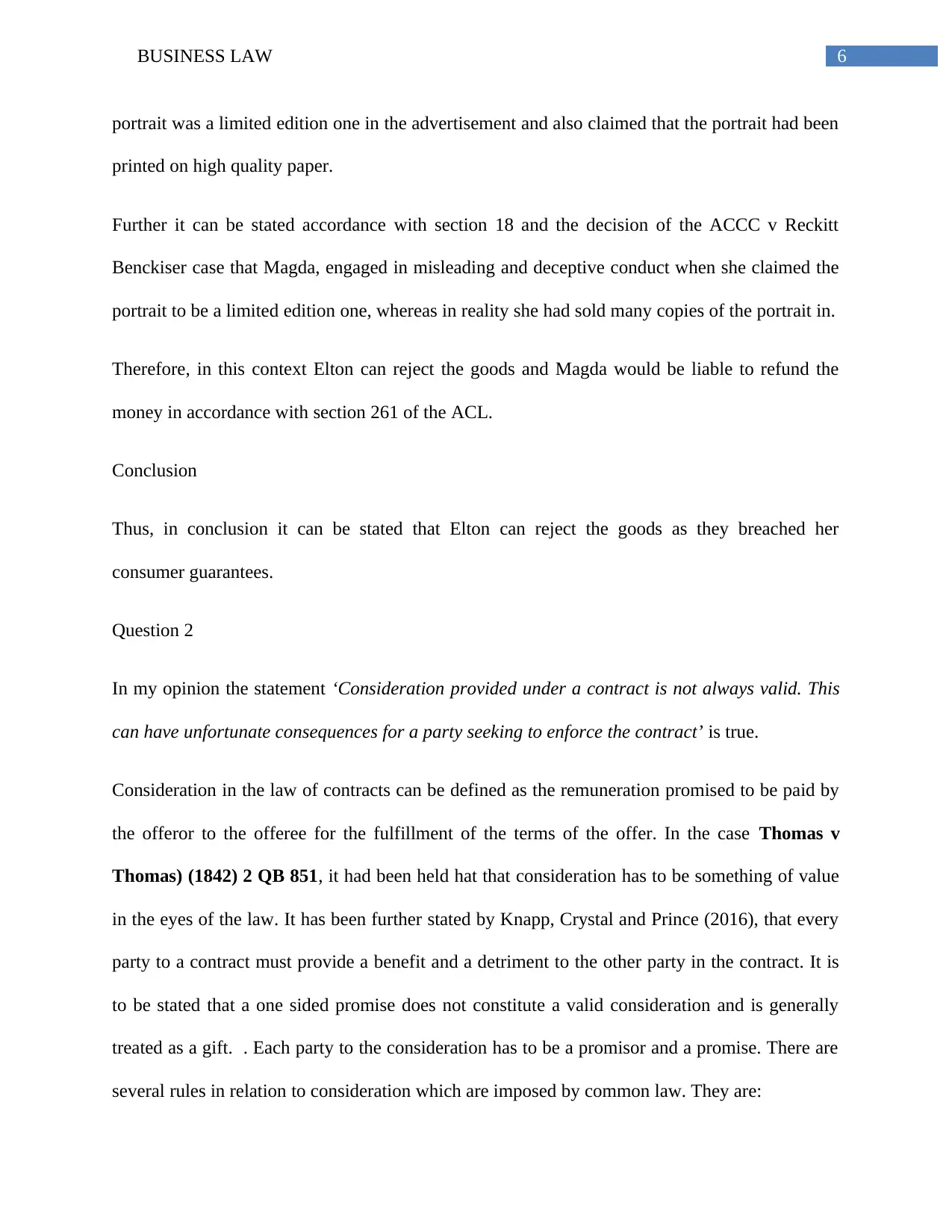
6BUSINESS LAW
portrait was a limited edition one in the advertisement and also claimed that the portrait had been
printed on high quality paper.
Further it can be stated accordance with section 18 and the decision of the ACCC v Reckitt
Benckiser case that Magda, engaged in misleading and deceptive conduct when she claimed the
portrait to be a limited edition one, whereas in reality she had sold many copies of the portrait in.
Therefore, in this context Elton can reject the goods and Magda would be liable to refund the
money in accordance with section 261 of the ACL.
Conclusion
Thus, in conclusion it can be stated that Elton can reject the goods as they breached her
consumer guarantees.
Question 2
In my opinion the statement ‘Consideration provided under a contract is not always valid. This
can have unfortunate consequences for a party seeking to enforce the contract’ is true.
Consideration in the law of contracts can be defined as the remuneration promised to be paid by
the offeror to the offeree for the fulfillment of the terms of the offer. In the case Thomas v
Thomas) (1842) 2 QB 851, it had been held hat that consideration has to be something of value
in the eyes of the law. It has been further stated by Knapp, Crystal and Prince (2016), that every
party to a contract must provide a benefit and a detriment to the other party in the contract. It is
to be stated that a one sided promise does not constitute a valid consideration and is generally
treated as a gift. . Each party to the consideration has to be a promisor and a promise. There are
several rules in relation to consideration which are imposed by common law. They are:
portrait was a limited edition one in the advertisement and also claimed that the portrait had been
printed on high quality paper.
Further it can be stated accordance with section 18 and the decision of the ACCC v Reckitt
Benckiser case that Magda, engaged in misleading and deceptive conduct when she claimed the
portrait to be a limited edition one, whereas in reality she had sold many copies of the portrait in.
Therefore, in this context Elton can reject the goods and Magda would be liable to refund the
money in accordance with section 261 of the ACL.
Conclusion
Thus, in conclusion it can be stated that Elton can reject the goods as they breached her
consumer guarantees.
Question 2
In my opinion the statement ‘Consideration provided under a contract is not always valid. This
can have unfortunate consequences for a party seeking to enforce the contract’ is true.
Consideration in the law of contracts can be defined as the remuneration promised to be paid by
the offeror to the offeree for the fulfillment of the terms of the offer. In the case Thomas v
Thomas) (1842) 2 QB 851, it had been held hat that consideration has to be something of value
in the eyes of the law. It has been further stated by Knapp, Crystal and Prince (2016), that every
party to a contract must provide a benefit and a detriment to the other party in the contract. It is
to be stated that a one sided promise does not constitute a valid consideration and is generally
treated as a gift. . Each party to the consideration has to be a promisor and a promise. There are
several rules in relation to consideration which are imposed by common law. They are:
Paraphrase This Document
Need a fresh take? Get an instant paraphrase of this document with our AI Paraphraser
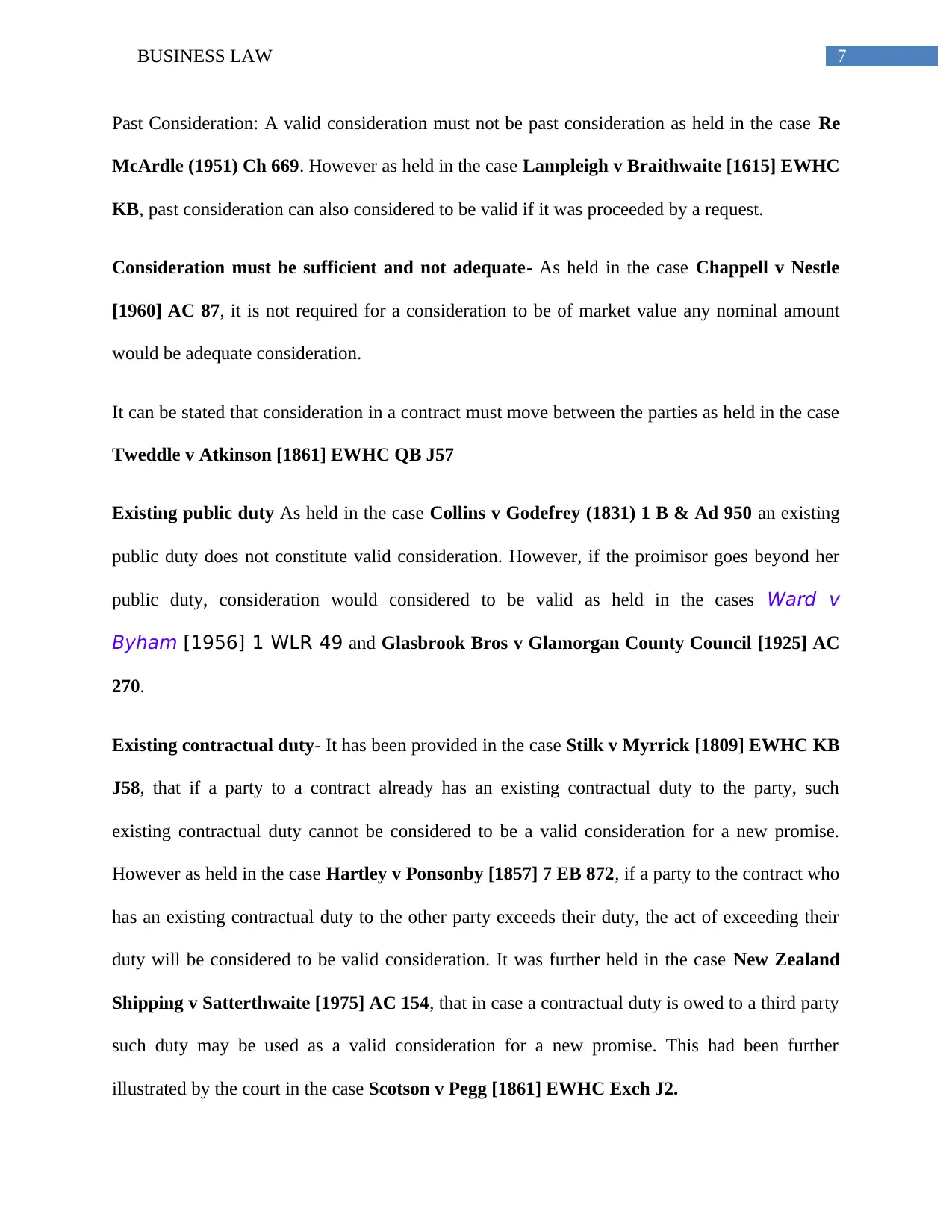
7BUSINESS LAW
Past Consideration: A valid consideration must not be past consideration as held in the case Re
McArdle (1951) Ch 669. However as held in the case Lampleigh v Braithwaite [1615] EWHC
KB, past consideration can also considered to be valid if it was proceeded by a request.
Consideration must be sufficient and not adequate- As held in the case Chappell v Nestle
[1960] AC 87, it is not required for a consideration to be of market value any nominal amount
would be adequate consideration.
It can be stated that consideration in a contract must move between the parties as held in the case
Tweddle v Atkinson [1861] EWHC QB J57
Existing public duty As held in the case Collins v Godefrey (1831) 1 B & Ad 950 an existing
public duty does not constitute valid consideration. However, if the proimisor goes beyond her
public duty, consideration would considered to be valid as held in the cases Ward v
Byham [1956] 1 WLR 49 and Glasbrook Bros v Glamorgan County Council [1925] AC
270.
Existing contractual duty- It has been provided in the case Stilk v Myrrick [1809] EWHC KB
J58, that if a party to a contract already has an existing contractual duty to the party, such
existing contractual duty cannot be considered to be a valid consideration for a new promise.
However as held in the case Hartley v Ponsonby [1857] 7 EB 872, if a party to the contract who
has an existing contractual duty to the other party exceeds their duty, the act of exceeding their
duty will be considered to be valid consideration. It was further held in the case New Zealand
Shipping v Satterthwaite [1975] AC 154, that in case a contractual duty is owed to a third party
such duty may be used as a valid consideration for a new promise. This had been further
illustrated by the court in the case Scotson v Pegg [1861] EWHC Exch J2.
Past Consideration: A valid consideration must not be past consideration as held in the case Re
McArdle (1951) Ch 669. However as held in the case Lampleigh v Braithwaite [1615] EWHC
KB, past consideration can also considered to be valid if it was proceeded by a request.
Consideration must be sufficient and not adequate- As held in the case Chappell v Nestle
[1960] AC 87, it is not required for a consideration to be of market value any nominal amount
would be adequate consideration.
It can be stated that consideration in a contract must move between the parties as held in the case
Tweddle v Atkinson [1861] EWHC QB J57
Existing public duty As held in the case Collins v Godefrey (1831) 1 B & Ad 950 an existing
public duty does not constitute valid consideration. However, if the proimisor goes beyond her
public duty, consideration would considered to be valid as held in the cases Ward v
Byham [1956] 1 WLR 49 and Glasbrook Bros v Glamorgan County Council [1925] AC
270.
Existing contractual duty- It has been provided in the case Stilk v Myrrick [1809] EWHC KB
J58, that if a party to a contract already has an existing contractual duty to the party, such
existing contractual duty cannot be considered to be a valid consideration for a new promise.
However as held in the case Hartley v Ponsonby [1857] 7 EB 872, if a party to the contract who
has an existing contractual duty to the other party exceeds their duty, the act of exceeding their
duty will be considered to be valid consideration. It was further held in the case New Zealand
Shipping v Satterthwaite [1975] AC 154, that in case a contractual duty is owed to a third party
such duty may be used as a valid consideration for a new promise. This had been further
illustrated by the court in the case Scotson v Pegg [1861] EWHC Exch J2.
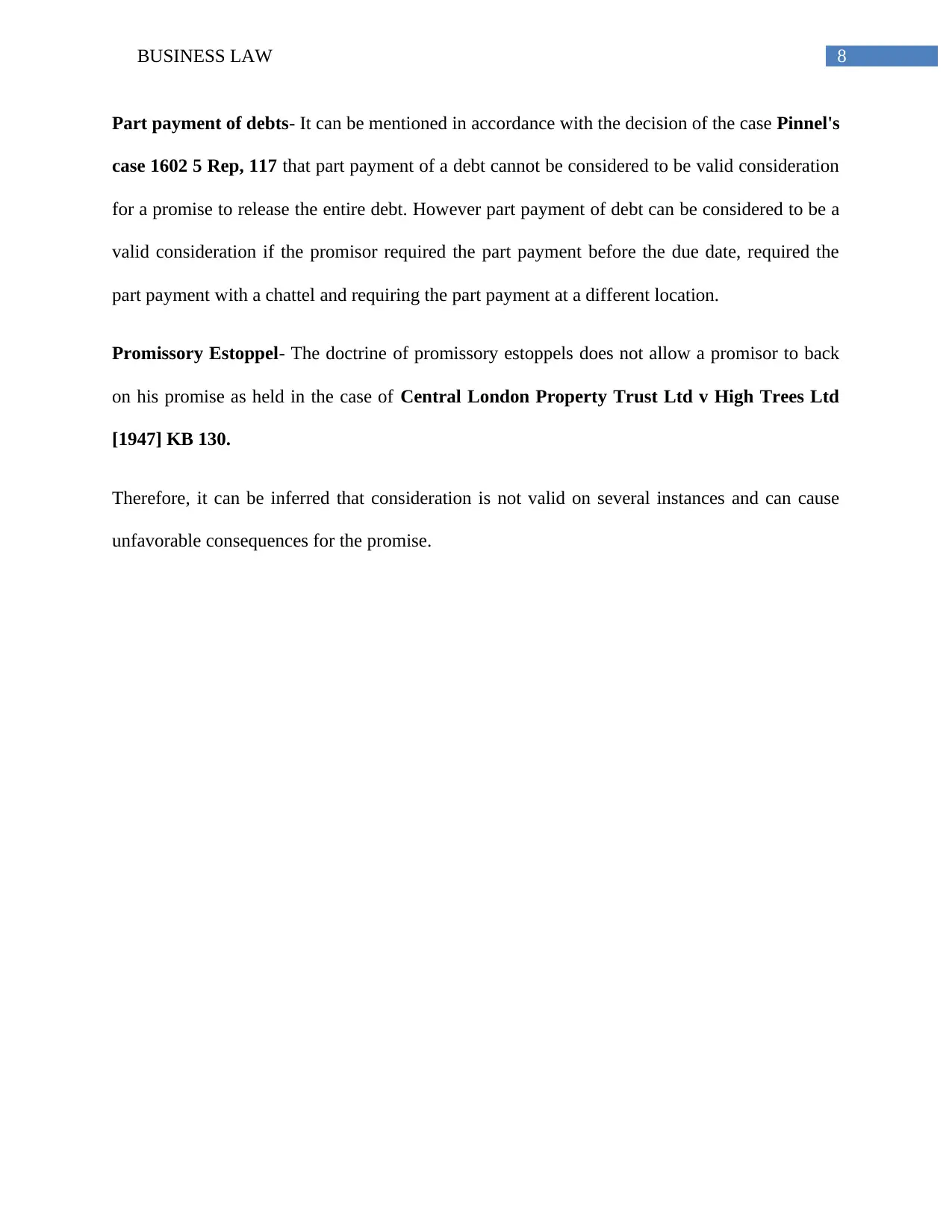
8BUSINESS LAW
Part payment of debts- It can be mentioned in accordance with the decision of the case Pinnel's
case 1602 5 Rep, 117 that part payment of a debt cannot be considered to be valid consideration
for a promise to release the entire debt. However part payment of debt can be considered to be a
valid consideration if the promisor required the part payment before the due date, required the
part payment with a chattel and requiring the part payment at a different location.
Promissory Estoppel- The doctrine of promissory estoppels does not allow a promisor to back
on his promise as held in the case of Central London Property Trust Ltd v High Trees Ltd
[1947] KB 130.
Therefore, it can be inferred that consideration is not valid on several instances and can cause
unfavorable consequences for the promise.
Part payment of debts- It can be mentioned in accordance with the decision of the case Pinnel's
case 1602 5 Rep, 117 that part payment of a debt cannot be considered to be valid consideration
for a promise to release the entire debt. However part payment of debt can be considered to be a
valid consideration if the promisor required the part payment before the due date, required the
part payment with a chattel and requiring the part payment at a different location.
Promissory Estoppel- The doctrine of promissory estoppels does not allow a promisor to back
on his promise as held in the case of Central London Property Trust Ltd v High Trees Ltd
[1947] KB 130.
Therefore, it can be inferred that consideration is not valid on several instances and can cause
unfavorable consequences for the promise.
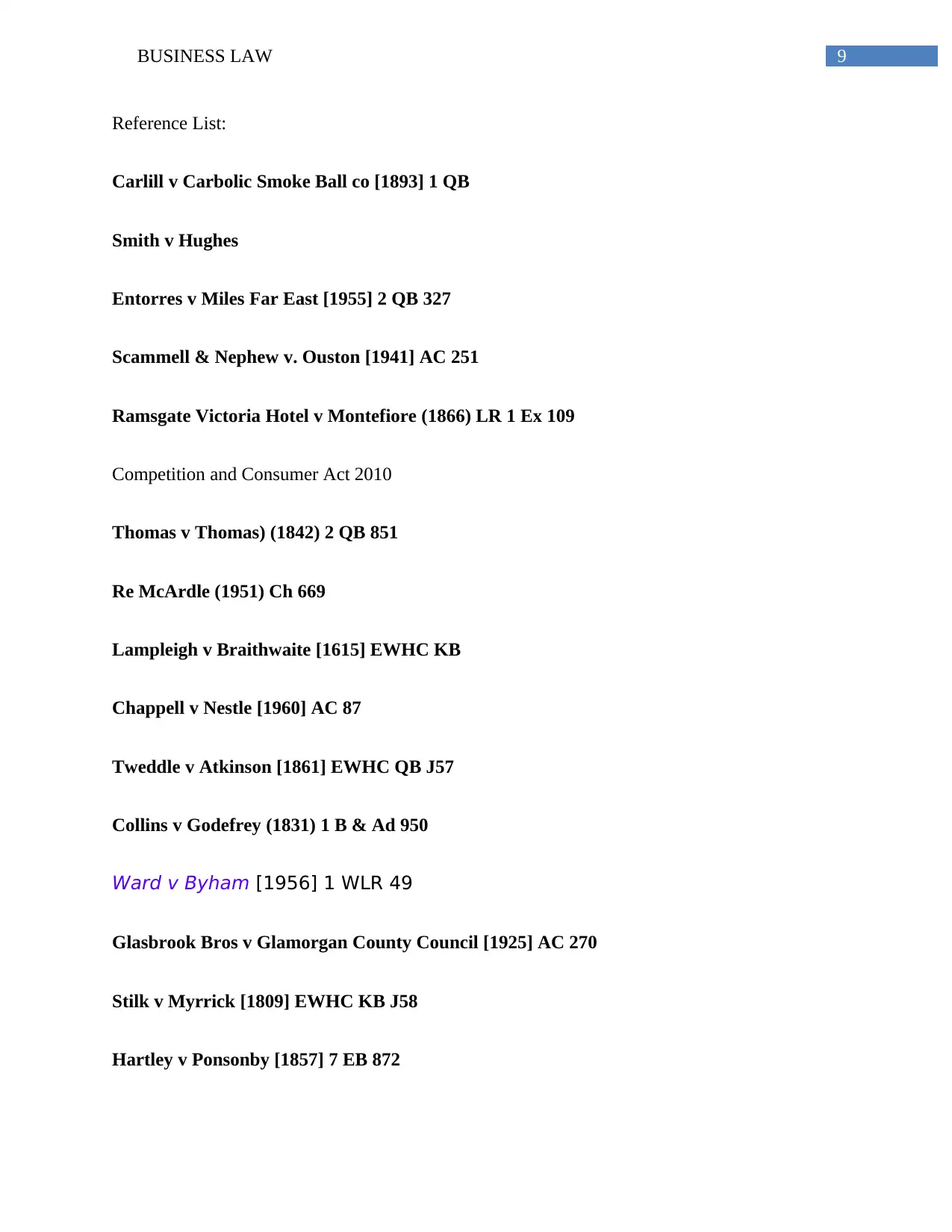
9BUSINESS LAW
Reference List:
Carlill v Carbolic Smoke Ball co [1893] 1 QB
Smith v Hughes
Entorres v Miles Far East [1955] 2 QB 327
Scammell & Nephew v. Ouston [1941] AC 251
Ramsgate Victoria Hotel v Montefiore (1866) LR 1 Ex 109
Competition and Consumer Act 2010
Thomas v Thomas) (1842) 2 QB 851
Re McArdle (1951) Ch 669
Lampleigh v Braithwaite [1615] EWHC KB
Chappell v Nestle [1960] AC 87
Tweddle v Atkinson [1861] EWHC QB J57
Collins v Godefrey (1831) 1 B & Ad 950
Ward v Byham [1956] 1 WLR 49
Glasbrook Bros v Glamorgan County Council [1925] AC 270
Stilk v Myrrick [1809] EWHC KB J58
Hartley v Ponsonby [1857] 7 EB 872
Reference List:
Carlill v Carbolic Smoke Ball co [1893] 1 QB
Smith v Hughes
Entorres v Miles Far East [1955] 2 QB 327
Scammell & Nephew v. Ouston [1941] AC 251
Ramsgate Victoria Hotel v Montefiore (1866) LR 1 Ex 109
Competition and Consumer Act 2010
Thomas v Thomas) (1842) 2 QB 851
Re McArdle (1951) Ch 669
Lampleigh v Braithwaite [1615] EWHC KB
Chappell v Nestle [1960] AC 87
Tweddle v Atkinson [1861] EWHC QB J57
Collins v Godefrey (1831) 1 B & Ad 950
Ward v Byham [1956] 1 WLR 49
Glasbrook Bros v Glamorgan County Council [1925] AC 270
Stilk v Myrrick [1809] EWHC KB J58
Hartley v Ponsonby [1857] 7 EB 872
Secure Best Marks with AI Grader
Need help grading? Try our AI Grader for instant feedback on your assignments.
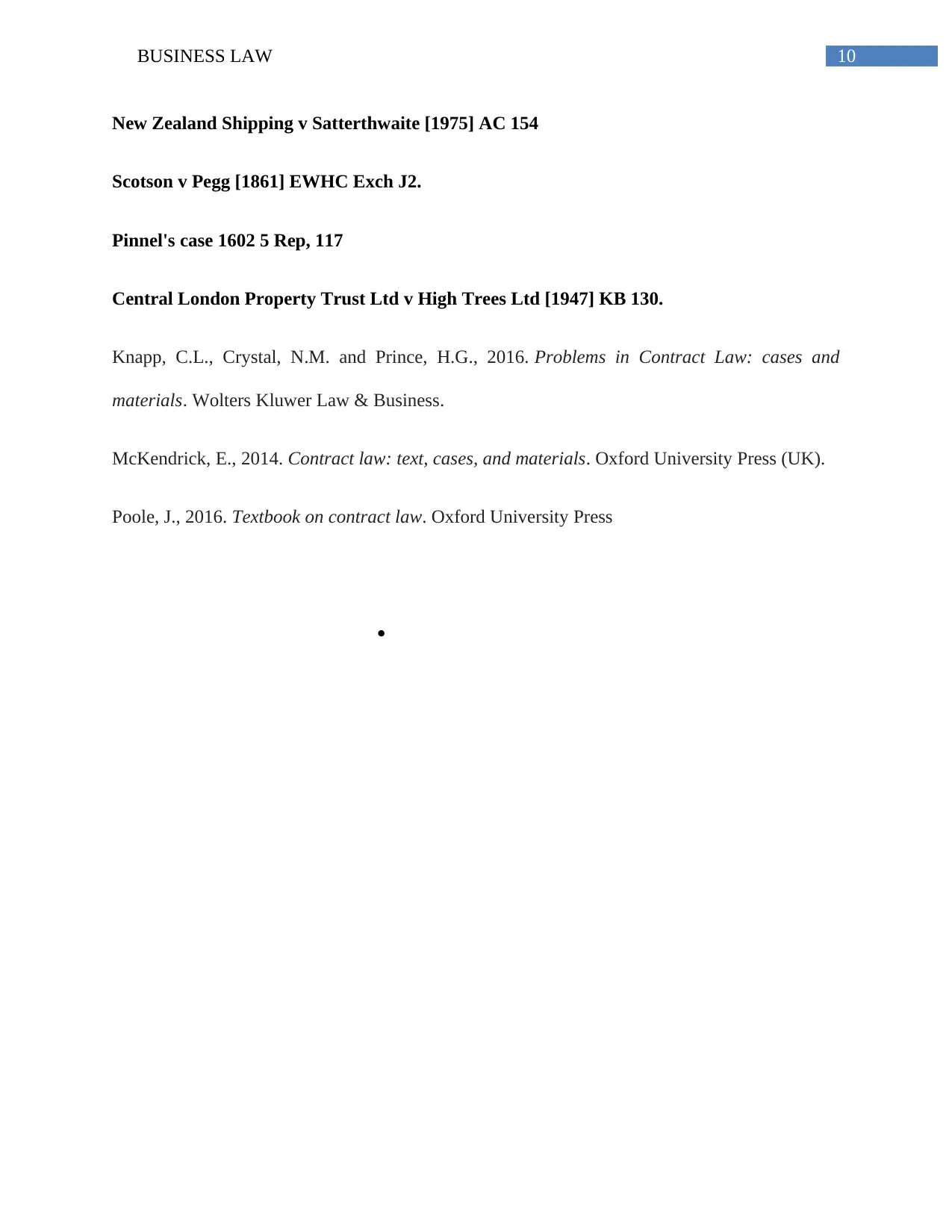
10BUSINESS LAW
New Zealand Shipping v Satterthwaite [1975] AC 154
Scotson v Pegg [1861] EWHC Exch J2.
Pinnel's case 1602 5 Rep, 117
Central London Property Trust Ltd v High Trees Ltd [1947] KB 130.
Knapp, C.L., Crystal, N.M. and Prince, H.G., 2016. Problems in Contract Law: cases and
materials. Wolters Kluwer Law & Business.
McKendrick, E., 2014. Contract law: text, cases, and materials. Oxford University Press (UK).
Poole, J., 2016. Textbook on contract law. Oxford University Press
New Zealand Shipping v Satterthwaite [1975] AC 154
Scotson v Pegg [1861] EWHC Exch J2.
Pinnel's case 1602 5 Rep, 117
Central London Property Trust Ltd v High Trees Ltd [1947] KB 130.
Knapp, C.L., Crystal, N.M. and Prince, H.G., 2016. Problems in Contract Law: cases and
materials. Wolters Kluwer Law & Business.
McKendrick, E., 2014. Contract law: text, cases, and materials. Oxford University Press (UK).
Poole, J., 2016. Textbook on contract law. Oxford University Press

11BUSINESS LAW
1 out of 12
Related Documents
Your All-in-One AI-Powered Toolkit for Academic Success.
+13062052269
info@desklib.com
Available 24*7 on WhatsApp / Email
![[object Object]](/_next/static/media/star-bottom.7253800d.svg)
Unlock your academic potential
© 2024 | Zucol Services PVT LTD | All rights reserved.





